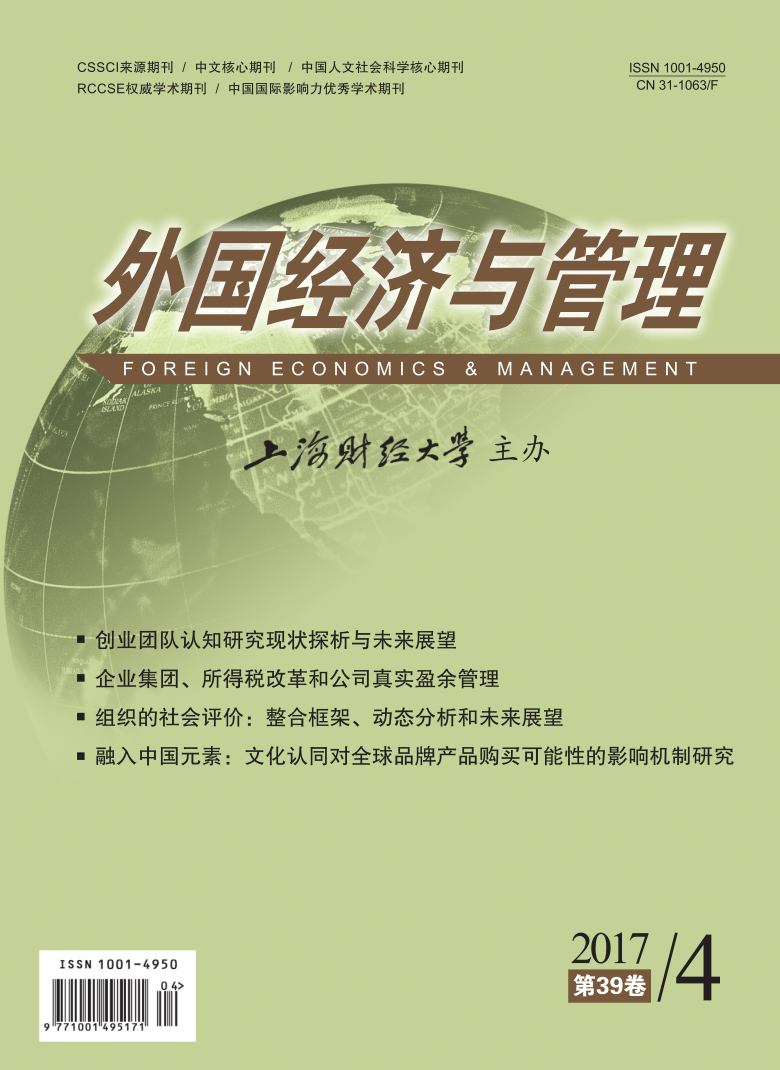本文以2008年的所得税改革为契机,分析了企业集团上市公司与非企业集团上市公司的盈余管理行为的差异。研究发现,在面临税率下降的情况下,与非企业集团相比,企业集团公司在进行盈余管理时更倾向于选择真实盈余管理。基于债务契约、资本市场压力、政治成本和代理成本的分析结果进一步显示,非税成本低、非国有产权背景和现金流权与控制权两权分离程度高的企业集团的负向真实盈余管理程度更高。本文的研究结论可为税收征管、证券市场监管以及投资者投资等提供依据。
企业集团、所得税改革和公司真实盈余管理
摘要
参考文献
8 Adhikari A, Derashid C, Zhang H. Earnings management to influence tax policy: Evidence from large Malaysian firms[J]. Journal of International Financial Management and Accounting, 2005, 16(2): 142–163. DOI:10.1111/jifm.2005.16.issue-2
9 Bartov E. The timing of asset sales and earnings manipulation[J]. The Accounting Review, 1993, 68(4): 840–855.
10 Beuselinck F, Deloof M. Earnings management in business groups: Tax incentives or expropriation concealment?[J]. The International Journal of Accounting, 2014, 49(1): 27–52. DOI:10.1016/j.intacc.2014.01.008
11 Burgstahler D, Hail L, Leuz C. The importance of reporting incentives: Earnings management in European private and public firms[R]. Working Paper04-07, 2004.
12 Choi J J, Kim M S. Reputation and real earnings management in business groups[R]. Working Paper, 2012.
13 Cohen D A, Dey A, Lys T Z. Real and accrual-based earnings management in the pre-and post-Sarbanes-Oxley periods[J]. The Accounting Review, 2008, 83(3): 757–787. DOI:10.2308/accr.2008.83.3.757
14 Desai M A, Dharmapala D. Earnings management, corporate tax shelters, and book-tax alignment[J]. National Tax Journal, 2009, 62(1): 169–186. DOI:10.17310/ntj.2009.1.00
15 Dewenter K, Novaes W, Pettway R H. Visibility versus complexity in business groups: Evidence from Japanese keiretsu[J]. The Journal of Business, 2001, 74(1): 79–100. DOI:10.1086/jb.2001.74.issue-1
16 Dow S, McGuire J. Propping and tunneling: Empirical evidence from Japanese keiretsu[J]. Journal of Banking & Finance, 2009, 33(10): 1817–1828.
17 Guenther D A. Earnings management in response to corporate tax rate change: Evidence from the 1986 tax reform act[J]. The Accounting Review, 1994, 69(1): 230–243.
18 Gunny K.What are the consequences of realearnings management?[R]. Working Paper, 2005.
19 He J, Mao X Y, Rui O M, et al. Business groups in China[J]. Journal of Corporate Finance, 2013, 22: 166–192. DOI:10.1016/j.jcorpfin.2013.05.001
20 Jiang G H, Lee C M C, Yue H. Tunneling through intercorporate loans: The China experience[J]. Journal of Financial Economics, 2010, 98(1): 1–20. DOI:10.1016/j.jfineco.2010.05.002
21 Jung K, Kim B, Kim B. Tax motivated income shifting and Korean business groups(Chaebol)[J]. Journal of Business Finance & Accounting, 2009, 36(5-6): 552–586.
22 Khanna T, Rivkin J. Estimating the performance effects of business groups in emerging markets[J]. Strategic Management Journal, 2001, 22(1): 45–74. DOI:10.1002/(ISSN)1097-0266
23 Khanna T, Yafeh Y. Business groups and risk sharing around the world[J]. The Journal of Business, 2005, 78(1): 301–340. DOI:10.1086/jb.2005.78.issue-1
24 Khanna T, Yafeh Y. Business groups in emerging markets: Paragons or parasites?[J]. Journal of Economic Literature, 2007, 45(2): 331–372. DOI:10.1257/jel.45.2.331
25 Kim J B, Yi C H. Ownership structure, business group affiliation, listing status, and earnings management: Evidence from Korea[J]. Contemporary Accounting Research, 2006, 23(2): 427–464. DOI:10.1506/7T5B-72FV-MHJV-E697
26 Klassen K J. The impact of inside ownership concentration on the trade-off between financial and tax reporting[J]. The Accounting Review, 1997, 72: 455–74.
27 Kothari S P, Leone A J, Wasley C E. Performance matched discretionary accrual measures[J]. Journal of Accounting and Economics, 2005, 39(1): 163–197. DOI:10.1016/j.jacceco.2004.11.002
28 Kuo J M, Ning L T, Song X Q. The real and accrual-based earnings management behaviors: Evidence from the split share structurereform in China[J]. The International Journal of Accounting, 2014, 49(1): 101–136. DOI:10.1016/j.intacc.2014.01.001
29 La Porta R, Lopez-de-Silanes F, Shleifer A. Corporate ownership around the world[J].The Journal of Finance, 1999, 54(2): 471–517. DOI:10.1111/0022-1082.00115
30 Maydew E L. Tax-induced earnings management by firms with net operating losses[J]. Journal of Accounting Research, 1997, 35(1): 83–96. DOI:10.2307/2491468
31 Monem R M. Earnings management in response to the introduction of the Australian gold tax[J]. Contemporary Accounting Research, 2003, 20(4): 747–774. DOI:10.1506/KC7W-C1VN-Y5D4-NAV4
32 Ross L W, Zimmerman J L. Towards a positive theory of the determination of accounting standards[J]. The Accounting Review, 1978, 53(1): 112–134.
33 Roychowdhury S. Earnings management through real activities manipulation[J]. Journal of Accounting and Economics, 2006, 42(3): 335–370. DOI:10.1016/j.jacceco.2006.01.002
34 Shleifer A, Vishny R W. A survey of corporate governance[J]. The Journal of Finance, 1997, 52(2): 737–783. DOI:10.1111/j.1540-6261.1997.tb04820.x
35 Zang A Y. Evidence on the trade-off between real activities manipulation and accrual-based earnings management[J]. The Accounting Review, 2012, 87(2): 675–703. DOI:10.2308/accr-10196
引用本文
胡志颖, 孙力. 企业集团、所得税改革和公司真实盈余管理[J]. 外国经济与管理, 2017, 39(4): 25–40.
导出参考文献,格式为:





 7083
7083  8394
8394

